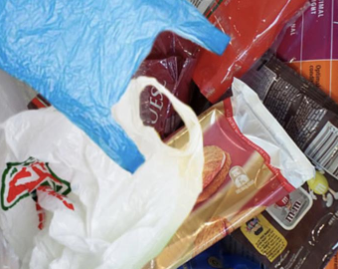Are You Recycling Your Soft Plastics?

Have you ever noticed that weird shaped bin at the front of the supermarket bulging with plastic bags?

Soft Recycling Schemes have been implemented in New Zealand, to reduce our landfill and decrease the risk of plastic getting into our oceans. In May, 2018, a goal was set, striving for 35% of soft plastic recycled nationwide by 2025. The Soft Plastic Recycling Scheme was placed under the Waste Minimisation Act (2018), and more bins than ever have been placed throughout communities.
But if you ask a friend or family member if they recycle their soft plastics, chances are, they’ll have no idea what you’re talking about.
UPDATE: The Soft Plastic Recycling Scheme has been relaunched in certain locations in Auckland. A cool homegrown NZ business is melting and reforming the plastic into fence posts! Read more here. If the capacity to reuse plastics grows, the recycle bins will be spread wider, than the 37 Auckland stores, to Wellington and Waikato. Soft Plastics has been being stockpiled as Replas in Australia could no longer deal with the capacity from NZ. It is great that a solution to this is growing, however reducing should always be the first option.
On July 1st, 2019 the Plastic Shopping Bag Ban will take place in NZ. Retailer Guide to Plastic Bag Ban can be found here.
What is Soft Plastic Recycling?!
‘Soft plastic’ is a term used to describe Type 4 Plastic: Low Density Polyethylene (LDPE). These plastics can be scrunched easily in your hand, excluding gladwrap/cling film which cannot be recycled.
For years, we’ve been putting our soft plastics into landfill, or worse, placing them in our recycling bin in the hopes they’ll be recycled. Soft plastics contaminate recycling bins, and deem the whole bin not recyclable and destined for landfill.
Now, Love NZ recycling bins facilitate soft plastic separation and a recycling scheme. You’ll find these bins outside most New World, Countdown, and Pak’n Save stores.
Use this helpful tool to find a soft recycling bin near you.
What you CAN put in the Soft Plastic Recycling Bin:
- Carry bags
- Bread bags
- Cereal box packets
- Chip packets
- Biscuit packets
- Confectionary wrappers
- Frozen food wrappers
- Bubble wrap (cut into sizes A3 and smaller)
- Courier packs
- Thin plastic packaging from toilet paper, nappies, paper towels, sanitary products, and other new items

What NOT to put in the Soft Plastic Recycling Bin:
- Glad wrap (cling film)
- Compostable bags
- Heavy foiled bags (like coffee bags, and dog biscuit bags)
- Straws (check out our drinking straws instead!)
Unfortunately, throwing your smelly food wrappers into the soft plastic recycling won’t work.
Follow these steps to get it right:
Clean your soft plastics:
Food remnants, liquids, and crumbs, will disrupt the recycling system, and contaminate the entire soft plastics bin. Making sure your soft plastics are washed properly before putting them in the bin, is crucial. This also helps to reduce smells, meaning it’s more feasible for you to gather soft recycling in your home, without stinky messes.
Dry your soft plastics:
Water will interfere with the recycling process of soft plastics. It’s essential your plastic is dried after washing.
- Hang your plastics on the washing line (with extra strong pegs so they don’t blow away)
- Lay your plastics over the dish rack in the evening, and they will be dry and ready for recycling in the morning
How are our soft plastics recycled?
Until recently, our soft plastics have been shipped to Australia, and recycled by Replas. Replas recycle our soft plastics into bollards, benches, playground equipment, traffic control objects, and garden products.

The Process:
Soft plastic bales are put into a densifier, which blends the plastic and cuts it up into tiny little pieces. The friction of this process causes heat, turning the plastic into a gluey consistency. Water is added to solidify, and the plastic pieces are cooled down by a large fan system. The plastic material then moves into a granulator, to be chopped up into smaller pieces. These smaller plastic pieces are then funnelled into a moulder machine. This heats and moulds the plastic into the right shape: a bench, bollard, or fitness equipment!
The Soft Recycling Crisis:
Replas have been taking our soft plastic recycling since 2015, but now, they’ve become inundated with too much plastic. The demand for the objects they turn them into, doesn’t match the amount being sent to them. Replas have currently closed their doors.
New Zealand is in a state of decision making. Our soft plastic piles high in storage, waiting to be recycled sustainably. Creating an end market for the products that we can make from soft plastics is an important step in closing this waste loop - make sure you tell your local council that you want park benches made from recycled content. Need new outdoor furniture? Why not look at some of those product for yourself instead of using virgin material?
SAY NO TO SOFT PLASTICS
It’s important for us to continue washing and sorting our recycling, to show consumers will support recycling schemes. But the main solution lies in avoiding it altogether!
Although recycling is a great way to reuse our waste, it’s not the end solution. Avoiding soft plastics, and instead opting for bulk bin stores, and package free products, eradicates the need for recycling.

We’re serious about package free, plastic free, and earth-loving living. For more tips on how to reduce your waste, head to the CaliWoods blog.
We will update as new information is available. We recommend:
1. Reduce Your Plastics as much as possible
2. Stop Waste Before It Starts
3. Use Recycling schemes as the last thing, rather than an excuse to buy
4. Check out our Bulk Food Shopping Guide
5. Choose Durable and Quality Reusable Alternatives. E.g. Reusable Straws, Stainless Pegs, Stainless Tumblers, Produce Bags.
Related Posts
- Tags: Advanced Eco Tips
0 comments

